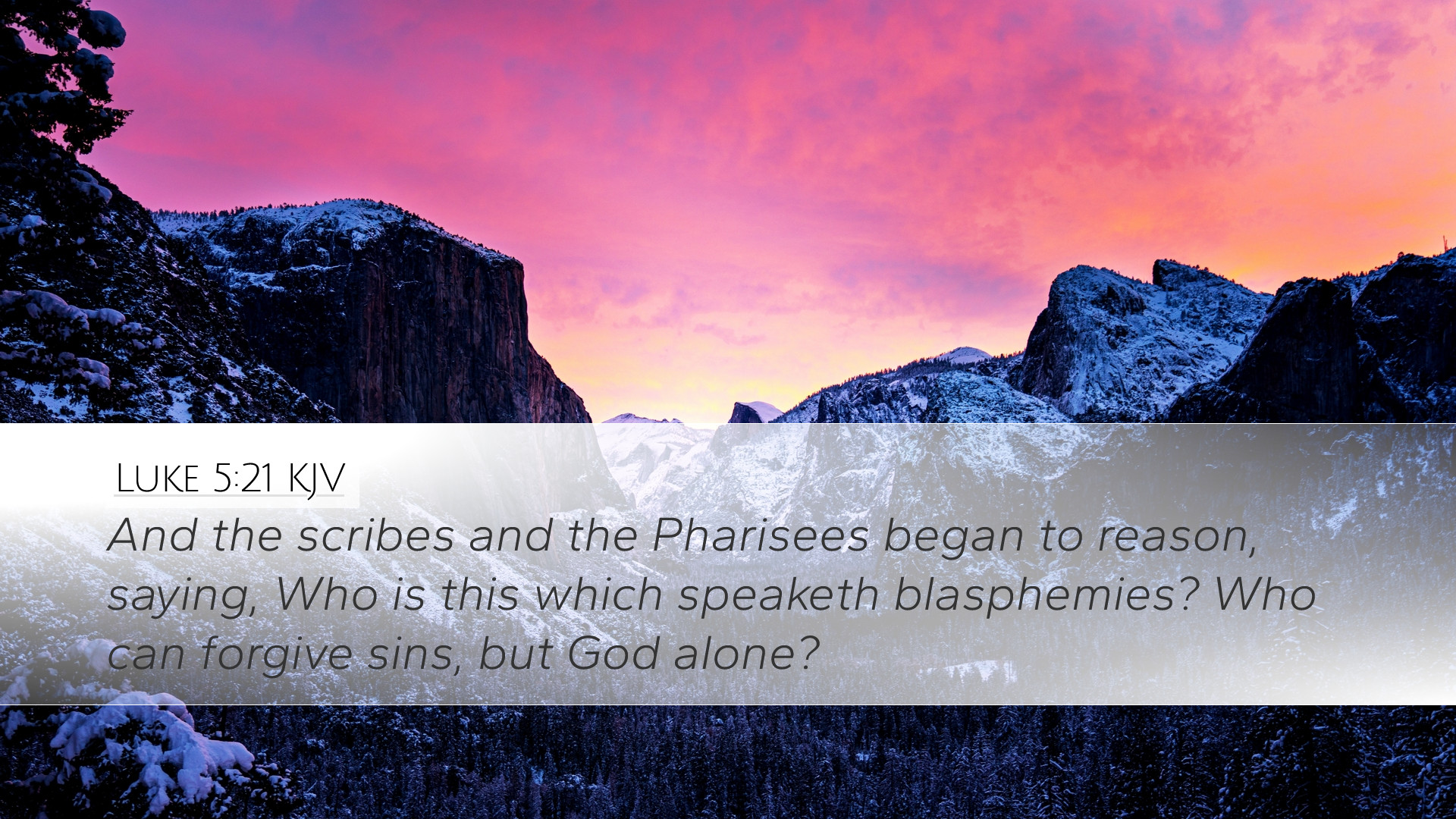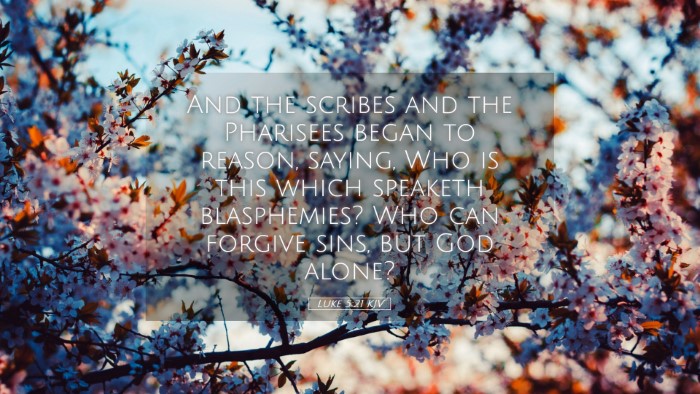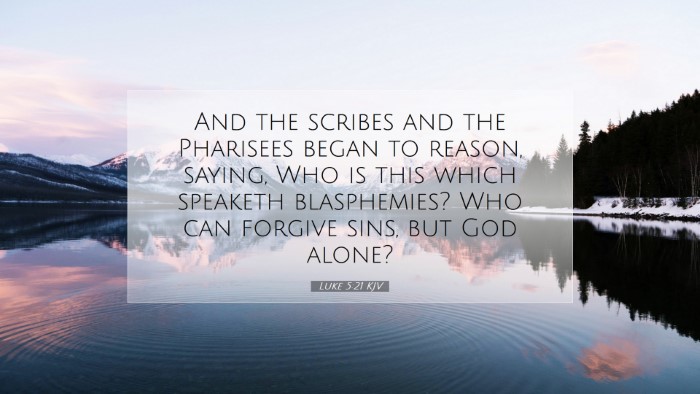Commentary on Luke 5:21
Luke 5:21 states: "And the scribes and the Pharisees began to reason, saying, Who is this which speaketh blasphemies? Who can forgive sins, but God alone?" This verse presents a significant moment in the ministry of Jesus, highlighting the tension between Him and the religious authorities of His time.
Contextual Background
The scene unfolds shortly after Jesus has healed a paralytic man, demonstrating His power over physical ailments and spiritual authority. This act of healing generates discussion and skepticism among the scribes and Pharisees, who begin to question Jesus' authority and identity.
Insights from Matthew Henry
Matthew Henry emphasizes the nature of the scribes and Pharisees’ response to Jesus’ proclamation of forgiveness. He notes:
- Reasoning from Tradition: The scribes, who represent the Jewish religious elite, interpret Jesus’ claims through the lens of their established traditions. They are quick to accuse Him of blasphemy because they believe that only God has the authority to forgive sins.
- Understanding of Authority: Henry points out that their reasoning stems from a correct understanding of God's singular authority, yet they fail to recognize that Jesus, as the Son of God, shares this divine prerogative.
- Indictment of Spiritual Blindness: The reaction of the Pharisees illustrates a deeper spiritual blindness; they are unable to see who Jesus is despite the visible miracles and the extraordinary claims He makes.
Insights from Albert Barnes
Albert Barnes, in his exegesis, provides further depth to the motivations of the Pharisees:
- Legalism vs. Grace: Barnes notes that the Pharisees’ strict adherence to the Law blurs their understanding of grace. Their question, "Who can forgive sins, but God alone?" reflects their legalistic standpoint, which does not permit room for the revolutionary nature of grace that Jesus embodies.
- Divine Authority of Jesus: He argues that the question posed by the Pharisees inadvertently points to Jesus’ divine nature. They challenge His authority not knowing that He is indeed God incarnate, capable of forgiving sins.
- Covenantal Dynamics: Barnes also draws on the implications of covenantal relationships, suggesting that Jesus’ authority to forgive is rooted in His identity as the mediator of the new covenant.
Insights from Adam Clarke
Adam Clarke builds upon the discourse by addressing the deeper theological implications of the verse:
- Blasphemy Accusations: Clarke explains that the Pharisees’ accusation of blasphemy reflects the seriousness of claiming equality with God. He emphasizes that blasphemy under the Law had strict penalties, heightening the stakes of Jesus’ claims.
- Understanding Sin and Forgiveness: Clarke elucidates the concept of sin as a vertical offense against God that necessitates divine forgiveness. The Pharisees' inability to grasp this concept ultimately leads to their rejection of Jesus.
- Revelation of Christ’s Nature: He further asserts that this moment serves as a revelation of Christ's dual nature—fully human and fully divine. Jesus’ pronouncement is not merely an act of compassion but a declaration of His divine role as the forgiver of sins.
Theological Implications
The interaction between Jesus and the Pharisees in this verse raises profound theological questions concerning:
- The Nature of Authority: It demonstrates the challenge to understand the divine authority of Jesus in the context of entrenched religious systems.
- The Character of Forgiveness: It highlights the necessity of divine forgiveness in the human experience and emphasizes that true healing encompasses both physical and spiritual restoration.
- The Role of Faith: The faith of the paralytic and his friends serves as a critical starting point for understanding how faith interacts with divine authority and forgiveness.
Application for Pastors and Theologians
In applying the insights of Luke 5:21, pastors and theologians may consider the following:
- Preaching on Forgiveness: This text provides a powerful foundation for preaching on the themes of sin, grace, and the authority of Christ to forgive. It invites congregations to reflect on their understanding of forgiveness both received and given.
- Engaging with Legalistic Tendencies: The responses of the Pharisees serve as a cautionary tale against rigid legalism that can hinder the recognition of God’s grace in Jesus. Pastors are called to challenge legalistic attitudes and promote a deeper understanding of grace.
- Practicing Compassion and Healing: The act of Jesus healing the paralytic serves as a model for the ministry of the church today, inviting believers into a compassionate engagement with the brokenness of the world.
Conclusion
Luke 5:21 encapsulates a pivotal moment in Jesus’ ministry that demonstrates both His authority and the challenges posed by religious leaders of the day. The combined insights from Matthew Henry, Albert Barnes, and Adam Clarke offer a rich tapestry of understanding that is vital for scholars, students, and practitioners of the faith. As we delve into this verse, we are reminded of the grace of God that forgives, heals, and transforms lives.


